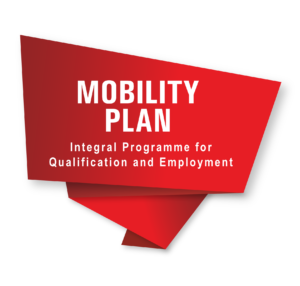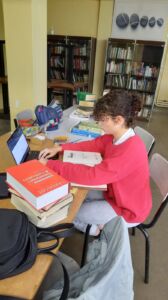Company: Hispano-Belga ASBL
Internship Tutor: Laura Fernández
Graduate Trainee: Ana Díez Leza
“Working and living abroad is all about opportunities.”
The Mobility Plan of the Integral Programme for Qualification and Employment (PICE) is a programme managed by the Official Spanish Chamber of Commerce in Belgium and Luxembourg in the two countries. The programme, created by the Spanish Chamber of Commerce and co-financed by the European Social Fund, offers young Spanish graduates the possibility to live a professional experience in another EU country for a period of 3 or 6 months.
Among the companies participating in the programme in Belgium is Hispano-Belga ASBL. The Association offers a meeting place for elderly people, mostly Spanish-speaking, and aims to promote a life as autonomous as possible, fostering social relations as well as individual well-being through activities. From September 2022 to March 2023, Laura Fernández, responsible for the organisation of organisation of activities and management at Hispano Belga – Grupo Senior, welcomed the Spanish graduate Ana Díez. Both of them explain their impressions after the mobility and encourage other companies in Belgium and Luxembourg to join the programme.
Company experience
Why did you decide to host an intern through the PICE Programme? What do you think Spanish interns can bring to your company?
Laura Fernández: “I had previous experience of working with the PICE Programme in another organisation, and it had always been very positive, so when I started working at the Grupo Senior, I had no doubt that it would be a great opportunity. Trainees working through the programme have the advantage of being graduates, so the approach to work is different; if the roles and tasks are well defined and structured, they can work with sufficient autonomy, they come with enthusiasm and a lot of motivation, and they often bring a very interesting external view”.
How was the reception process and the settlement of the interns?
L.F.: “Ana has been a real gem for the Grupo Senior, her skills, training and knowledge are excellent, and her character and attitude are a real plus. Smiling, calm, patient, observant, with a sense of humour and excellent communication and willingness; the contact and relationship with the people who participate and are part of the Senior Group has been impeccable.
In order to facilitate adaptation and mutual knowledge, Ana participated in all the programmed activities during the first two weeks. From the second week onwards, her timetable was structured to combine work in the library, with the public depending on the programme of activities”.
Which were the tasks carried out by the interns during their stay in the company?
L.F.: “Ana worked the inventory, organization and classification of the documentary bibliographic funds of the Association in paper support. She participated in the tasks necessary for the proper functioning of the library and in the drafting of rules for the usage of the system used to organize the library. He offered attention and organization of services to users and interviewed them to learn about their experience”.
Did having an external vision bring any innovation to the company?
L.F.: “Of course, the fact of incorporating a young person, recently graduated, with motivation and enthusiasm, brings interesting and different proposals and ideas.
In our case, the innovation brought by Ana to the library was at the level of processes and organisation, creating a new classification, organisation and selection system that is understandable and can be continued by any volunteer without the need for specific training.
For the Grupo Senior, the end of her internship is a real loss and we are deeply sorry that we do not have sufficient financial resources for her to continue with us”.
Which aspects of the programme and mobility could be improved?
L.F.: “The financial endowment, as it is clearly insufficient for the current standard of living. Our perception is that only those young people whose families have sufficient financial resources to support their stay in a foreign country can benefit from this experience, excluding young people without this financial cushion”.
Experience of the graduate
What would you highlight the most about this experience on a personal and professional level?
Ana Díez: “Working and living abroad is all about opportunities. On a professional level, working in the Grupo Senior of Hispano-Belga has been a great learning experience in the cultural field, being able to put into practice the knowledge acquired during my years of study. But not only that, it has also helped me to improve some professional skills such as evolution and the ability to adapt to the different situations that arise every day, especially in a place like this where people with different characters come every day.
On a personal level, I would like to highlight the new friendships and people (from different countries) that I have met, not only on a personal level, but also on a professional level. In addition, I have improved my French and English language skills by living in a city as culturally diverse as Brussels. The contact with many cultures and learning procedures has allowed me to broaden my perspective, to have a much more open mind, which means more empathy and tolerance”.
Is the way of working different in Belgium? Did you find it difficult to adapt?
A.D.: “Yes! The working hours are very different, since the shops close at 18:00 and the working day ends. Teamwork is also very important. Cooperation with other people, respect and listening are very important characteristics that improve the professional experience.
Despite the differences, I am a person who adapts easily to changes and ways of working. That’s why I didn’t find it difficult to adapt to the working environment”.
Do you think that the offer of the companies in the programme is adequate?
A.D.: “In the field of humanities and culture there are only a few opportunities. I was lucky to come across the offer to become a Librarian at Hispano-Belga ASBL which suited my skills and knowledge”.
In your opinion, what could be improved? Has the mobility met your expectations?
A.D.: “On an economic level, I think that the amount offered is not enough compared to the standard of living in Belgium. Not only in terms of rents, but also in terms of the cost of living in general. Therefore, I think that the allowance given to the trainee could be improved in order to cover all basic expenses.
Despite this, the mobility has fully met my expectations. The people I met and worked with in Hispano-Belga (Laura, Maria Luz, the volunteers and participants…) have made my stay here a great first work experience abroad. I have learned more things than I expected, which have made me grow as a person and as a professional. I would surely repeat and recommend this programme to anyone who asks me”.
If you are interested in participating in the PICE programme, please send an email to Sara Sánchez (info@e-camara.com).






